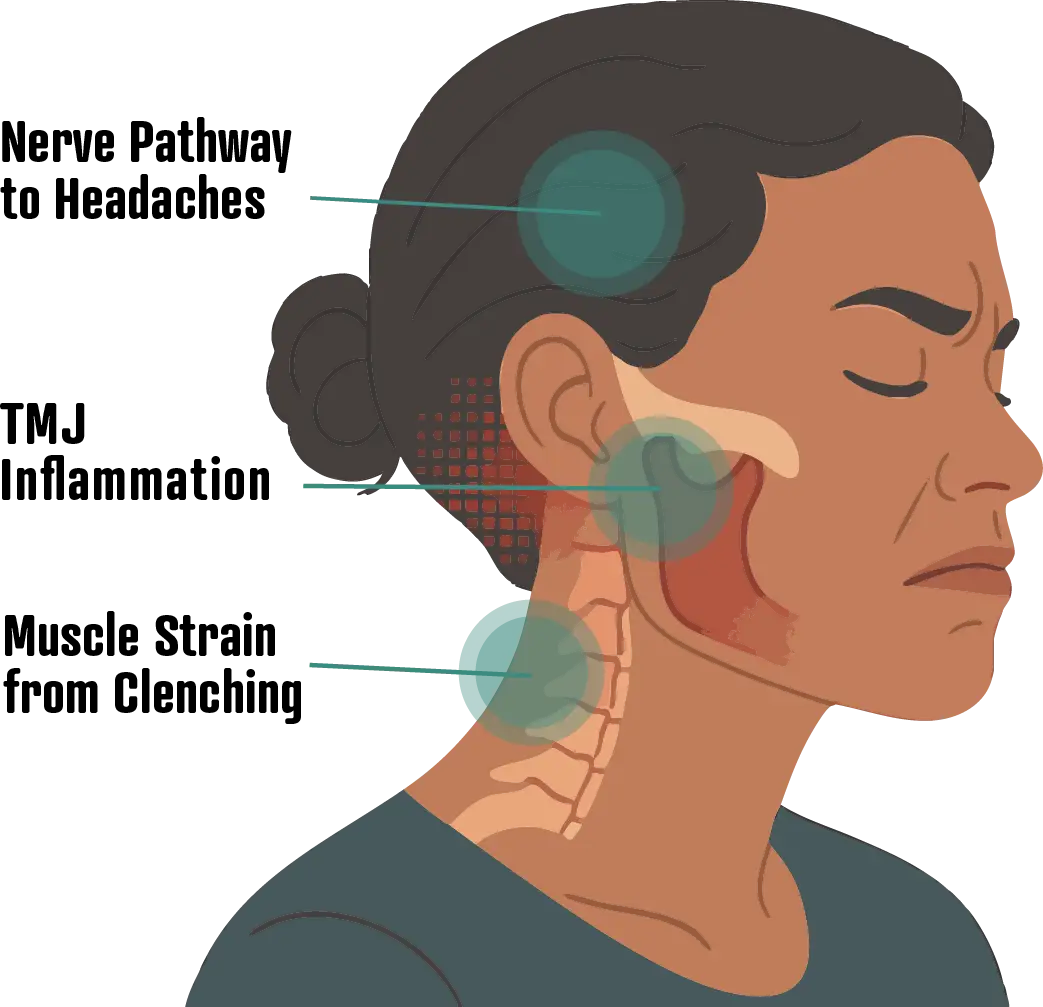Are You Unconsciously Grinding Your Teeth?
Regular jaw clenching is often an early indicator of TMJ dysfunction. If left unaddressed, it can result in headaches, dental wear, neck discomfort, and issues with sleep. At the TMJ & Sleep Therapy Centre of New Orleans, we focus on discovering and addressing the underlying causes rather than merely the symptoms.
Why Jaw Clenching Happens
Jaw clenching, commonly referred to as bruxism, typically arises as an unconscious reaction to stress, muscle tension, or misalignment in the temporomandibular joint (TMJ). When there is an uneven bite or inflammation in the jaw joint, the surrounding muscles tighten as a compensatory mechanism, even during sleep.
“Sleep bruxism is often connected to sleep-related breathing disorders and temporomandibular joint dysfunction.”
Source: National Library of Medicine
This persistent tension can lead to muscle fatigue, tooth damage, and nerve compression in the face and head. Many individuals exhibit clenching in relation to airway obstruction while sleeping, as the jaw tightens to help preserve airway flow. By reestablishing equilibrium in the jaw and alleviating overactive muscles, it is possible to reduce discomfort and associated symptoms.
When To Seek Treatment
Experiencing discomfort or tightness in your jaw muscles after waking can indicate a habit of grinding or clenching during sleep.
Ongoing muscle tension may extend to the temples, resulting in tightness or persistent dull headaches that can occur behind the eyes or forehead.
Frequent clenching can erode enamel and leave nerves exposed, which may lead to tooth pain or heightened sensitivity.
These signs often reflect tension or inflammation in the temporomandibular joint (TMJ), typically aggravated by habitual clenching.
Relief begins with the right diagnosis
Persistent jaw tension may result in prolonged damage and ongoing discomfort. At the TMJ & Sleep Therapy Centre of New Orleans, our non-invasive TMJ therapies target the root causes of clenching, aiming to restore proper jaw function.

Frequently Asked Questions About Jaw Clenching
Jaw clenching is not merely a habit; it usually indicates underlying issues with muscles or joints. Below are frequent questions that patients have regarding this condition.
The muscles may become tense to either protect the jaw joint or maintain airway stability.
When these muscles are strained or overused, it can result in headaches, facial pain, and tightness in the shoulders.
Many individuals experience clenching at night due to airway obstruction or muscle imbalance, not just emotional stress.
With appropriate treatment, most patients experience a significant decrease or complete cessation of clenching activity.
but it is most effective when used alongside TMJ therapy that addresses the underlying causes of clenching.
TMJ & Sleep Therapy Centre
Global Expertise
As proud members of TMJ International, we are part of a global team dedicated to advancing collaborative care in TMJ disorders and sleep therapy. Together, we bring innovation, expertise, and compassionate treatment to help patients find lasting relief and a healthier quality of life.

If you’re struggling with jaw pain, headaches, or sleep issues, the TMJ & Sleep Therapy Centre of Kansas City is here to help. Our team specializes in non-surgical TMJ and sleep therapy solutions designed to restore comfort and improve your quality of life.




